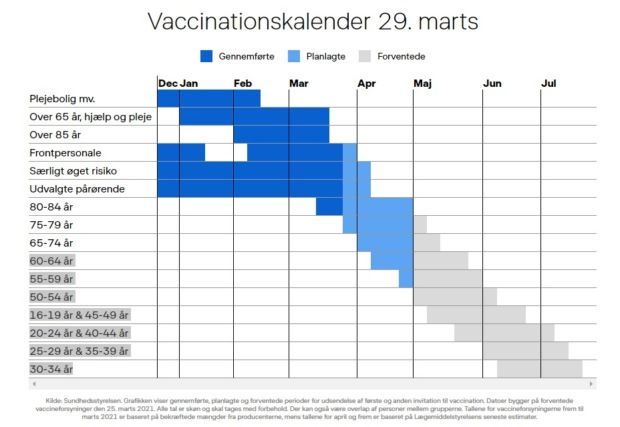News
Testing the engines today: 100,000-vaccination ‘stress test’ will confirm whether Denmark is capable of completing in late July
This article is more than 4 years old.
Danish punctuality will not be beneficial to optimal performance, warns media, as new schedule confirms that the 30-34 age bracket will have to wait the longest for both jabs

The fourth jab is on the way (photo: Pixabay)
Denmark proved on February 26 that it was capable of vaccinating 35,000 people against the coronavirus in one day, and now it is raising the stakes – three-fold!
Across the country today, it will attempt to vaccinate 100,000 (including 30,000 in the capital region) – a testing of the engines ahead of its plans to complete its program by July 25.
Professor Søren Riis Paludan from Aarhus University told DR the ‘stress test’ is “the beginning of the turbo we hope will very quickly bring us to a situation where those at risk of developing hospital-requiring COVID-19 are vaccinated”.
Should everything go to plan, the entire nation can expect to receive both their jabs by July 25.
Deliveries to grow in size
“We are doing this to prepare for the coming time when the delivery plans show we must be ready to receive larger deliveries,” explained the health minister, Magnus Heunicke, on Twitter.
According to the current delivery schedule (which includes the currently suspended jab AstraZeneca), Denmark will start to receive vastly more vaccines than previously: 250,000 a week in April, rising to 400,000 week in May, 800,000 in June and 1.3 million in July.
In total, it will need 6 million jabs to vaccinate the 3 million people in Denmark awaiting the vaccine who are under the age of 65, do not have a chronic illness or exceptional condition (such as pregnancy), and do not have a ‘frontline’ job.
Unlucky if you’re aged 30-34
To find out your vaccination date, visit here and answer ‘Nej’ to all of the questions.
A glance at the approximate jab dates for all age groups suggest that the last ones to receive their full vaccinations will be people aged 30-34.
In order, the most preferential ages (so the ones to complete first) are people aged 60-64, 55-59, 50-54, 45-49 & 16-19, 40-44 & 20-24, 35-39 & 25-29, and finally 30-34 (see graph below).
As things stand, all of the groups bar the last three can be expected to be fully vaccinated by the end of June, so potentially great timing for the July holiday.
However, the vaccination program has already been changed seven or eight times, and the dates are somewhat dependent on the AstraZeneca jabs resuming.

Vaccination completion dates April-July 2021 (screenshot from Sundhedsstyrelsen)
‘Danish punctuality’ not beneficial
One issue that came to attention when they jabbed 35,000 in one day in February was that Danish punctuality is not beneficial.
DR reports that the tendency of many people to be “too early must be avoided in a situation where it is still important to keep your distance from each other”.
“Do not arrive 15-30 minutes before you have an appointment,” Lisbeth Ejskjær, a nurse at Sygehus Lillebælt in Vejle, where 10,000 vaccinations (four times more than normal) are expected, told DR.
“It’s not a good idea at these corona centres, because it creates pressure on the queue. That’s the kind of thing we’re aware of. It is important for the flow.”










































